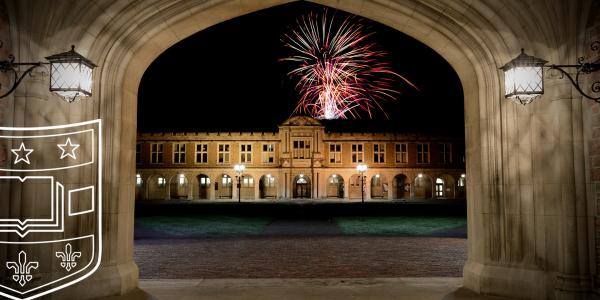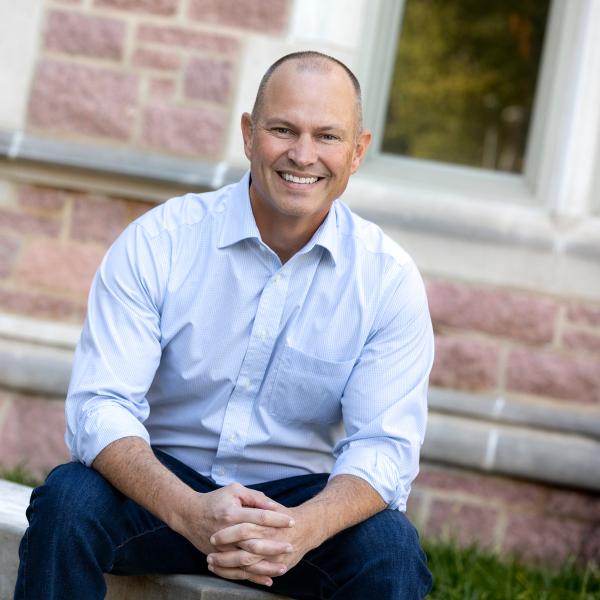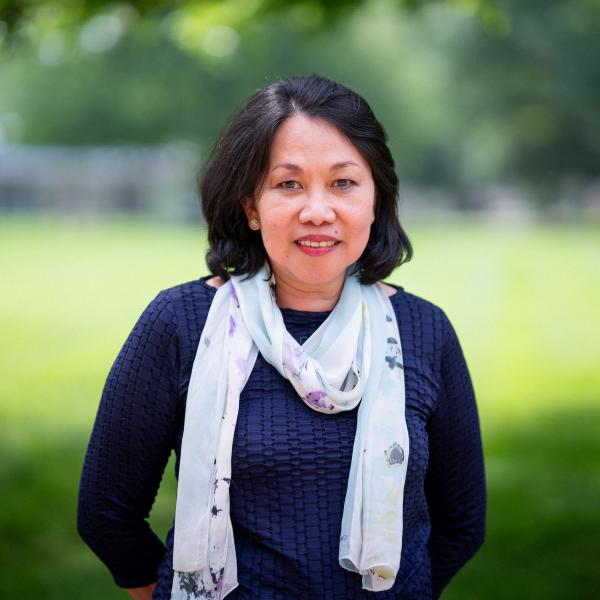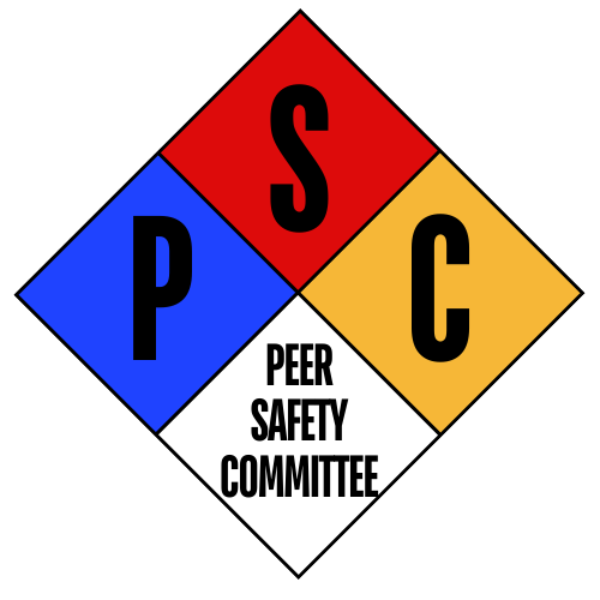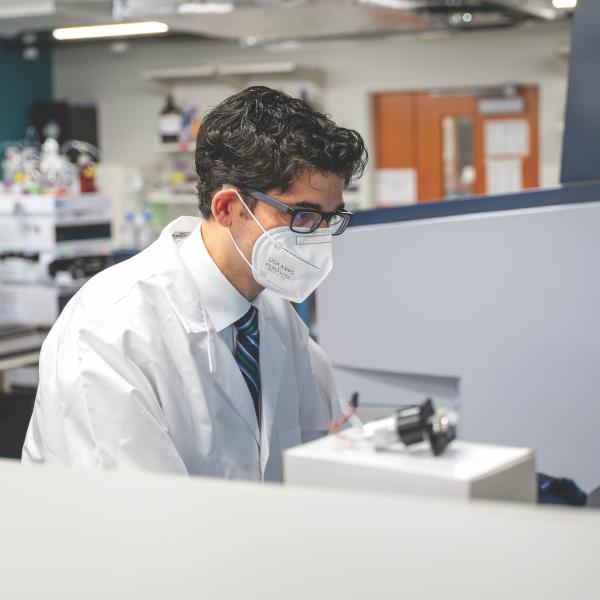The Department of Chemistry is pleased to announce our 2021 research and teaching award winners, and we congratulate all our graduating seniors!
Sowden Prize
Michael Moore, advisor Timothy Wencewicz, and Brandon Campbell, advisor Bryce Sadtler, were both named winners of this year's John C. Sowden Memorial Prize, the highest honor bestowed by the Department of Chemistry. The Sowden Prize is awarded for outstanding achievement by a chemistry major, recognizing excellence in both research and coursework. The prize honors John C. Sowden, chair of the chemistry department from 1956 to 1963. Sowden was a carbohydrate chemist who collaborated with nuclear and radiochemists at Washington University to create radiolabeled carbohydrates that helped to reveal mechanisms of carbohydrate reactions.
Wencewicz described Moore as a dedicated researcher and creative problem solver who has taken on numerous research tasks, including synthesizing molecules, making proteins, and setting up enzyme assays. In addition to his work in Wencewicz Lab, Moore served as a TA for multiple chemistry classes. Moore’s accolades include winning the prestigious Goldwater Scholarship. Following graduation, Moore plans to attend medical school at WashU.
Campbell joined the Sadtler Lab during his first year at WashU and has made numerous contributions in his three and a half years there. Campbell worked on several projects involving the electrodeposition of inorganic semiconductor nanomaterials. He was a co-author on a paper published in Chemistry of Materials and highlighted in Scientific American. Campbell won a Goldwater Scholarship, an NSF GRFP fellowship, and will attend Harvard in the fall.
ACS Awards
Charles Nosal, advisor Timothy Wencewicz, received an ACS Organic Chemistry Award. The Division of Organic Chemistry of the American Chemical Society (ACS) sponsors this award to recognize achievement by undergraduate students in organic chemistry and to encourage further study in the field. Nosal joined the Wencewicz Lab in January 2020, right before things were shut down for the pandemic. Despite this challenge, Nosal took the initiative to write a review article on antibiotics, finding a way to be very productive at home and simultaneously spinning off an original research idea of his own.
Chiemela Izima, advisor Julio D’Arcy, received an ACS Inorganic Chemistry Award. The Division of Inorganic Chemistry of the American Chemical Society (ACS) sponsors this award, established in 2009, to recognize achievement by undergraduate students in inorganic chemistry and to encourage further study in the field. In D’Arcy Lab, Izima took on tough projects combining chemistry and engineering, producing forthcoming research in both aerosol chemistry and electrochemistry. D’Arcy described Izima as a “powerhouse” student and researcher, one who is gifted in synthesis.
Larry Chen, advisor Wayland Cheng, received an ACS Analytical Chemistry Award. The Division of Analytical Chemistry of the American Chemical Society (ACS) sponsors this award to encourage student interest in analytical chemistry and to recognize students who display an aptitude for a career in the field. This award is co-sponsored by the journal Analytical Chemistry. Chen worked on applying native mass spectrometry to study the interactions of lipids with ion channels – state-of-the-art technology in analytical chemistry. His research led to a co-authored publication in Analytical Chemistry.
Elena Cacchillo, advisor John-Stephen Taylor, was named this year’s Outstanding Junior. The Outstanding Junior Award is sponsored by the St. Louis Section of the American Chemical Society and recognizes one outstanding junior chemistry student from each college and university in the St. Louis area based on excellence in coursework and research. Cacchillo distinguished herself as an independent and enterprising researcher by learning how to use a new piece of mass spectrometry equipment, then developing training materials for other researchers. She has since developed additional tutorials on DNA chemistry and is applying her expertise to developing methods for understanding DNA damage.
Research Awards
Max Gruschka, advisor Jonathan Barnes, won the Lindsay Helmholz Award for outstanding achievement in inorganic/physical chemistry. The award is given in memory of Professor Helmholz, who is remembered for pursuing science for its own advancement. Gruschka has won numerous summer undergraduate research awards, distinguished himself as an outstanding TA in Chem 261, and excelled in a variety of research endeavors. Notably, Gruschka made important contributions to work on actuating hydrogels, earning an authorship credit on a recent publication from Barnes Lab, which appeared on the cover of Chemical Science.
Tiana Saak, advisor Jonathan Barnes, won this year's Arthur Wahl Memorial Prize. The prize honors outstanding achievement in inorganic/nuclear chemistry and is given in memory of Professor Wahl, who discovered a rare element during his thesis research that later resulted in the discovery of element 94, plutonium, along with J. Kennedy, E. McMillan, and G. Seaborg. Barnes described Saak as a gifted researcher, who thinks deeply about project design and execution. During her years with the Barnes Lab, Saak took on projects in polymer synthesis and light-activated hydrogels, and made them her own.
Cendi Ling, advisor Meredith Jackrel, received this year's David Lipkin Memorial Prize for outstanding achievement in organic or bio-organic chemistry. Professor Lipkin chaired the Department of Chemistry from 1964 to 1970, and his pursuit of excellence was instrumental in the building of McMillen Laboratories. Ling started working with Jackrel during her first year at WashU and has contributed to several projects on protein engineering. In particular, Ling has been studying protein disaggregases related to ALS, Parkinson’s disease, and Alzheimer’s disease.
Emily Aunins, advisor Timothy Wencewicz, won the C. David Gutsche Award for outstanding achievement in organic chemistry. The award is given in recognition of Professor Gutsche's achievements in organic chemistry, including his pioneering work in the development of calixarene chemistry. Aunins combines chemistry and microbiology to examine big picture questions, such as how do bacteria eat food? To tackle this question, she synthesized molecules and learned how to study proteins in action in order to probe how life happens in an original and creative way.
Jessica Yu, advisor Hani Zaher, won the Merck Index Award. The award recognizes outstanding undergraduates across the United States and Canada for special achievement in Chemical Sciences. Students who receive this award have undertaken and excelled in undergraduate research projects, volunteered in the department and community, and excelled in their coursework overall. Zaher described Yu as very motivated and eager to get involved in research as soon as she joined his lab last fall. She quickly took on her own project and was able to gather publication quality data in just two months.
Teaching Awards
Jacob Blum, Abena Boateng, Irene Hamlin, Mallory Kallish, and Amy Kwan received Peer-Led Team-Learning (PLTL) Awards. PLTL leaders must be dedicated and patient, and have performed exceptionally well in general chemistry. The PLTL Award recognizes outstanding PLTL leaders, chosen based on their observed performance in PLTL sessions and positive feedback from their students.
Isabel Trenholm and Richa Sinkre won Residential Peer Mentor (RPM) Awards for their outstanding work mentoring freshman and sophomore chemistry students, their commitment to the general chemistry philosophy, and their demonstrated concern for the success of their students and the RPM program. During her three years as an RPM, Trenholm excelled as a mentor to hundreds of students and as a colleague on the RPM team. She volunteered for additional communication responsibilities when RPM moved online during the pandemic, ensuring that students continued to receive ample peer support. Sinkre has served as an RPM every semester she has been eligible, mentoring students in Chem 111/112 and Chem 105/106. Her flexibility in pivoting to an online platform has been particularly remarkable.
Ashton Barber, winner of this year's Chemistry Peer Mentor Award, was selected for her outstanding knowledge, dedication, patience, and willingness to share her learning experience with mentees. Since fall 2018, Barber has contributed significantly to the department’s teaching mission as both a peer mentor and faculty assistant. She’s an excellent communicator, able to present difficult topics clearly, and her caring and approachable personality helped her form strong bonds with mentees and inspire them with her leadership.
Morgan Leff won the Chemistry Lab Mentor Award, which recognizes her significant contributions to the general chemistry lab mentoring program, her extraordinary efforts to enhance the lab experience for undergraduate students, and her remarkable ability to explain complex chemical concepts clearly and increase student engagement and interest in the material. Leff’s flexibility and adaptability was especially valuable in meeting the unique scheduling challenges posed during the pandemic.
Charles Nosal received this year's Organic Learning Assistant Award. The award recognizes, encourages, and rewards organic chemistry learning/teaching assistants for their outstanding teaching performance and their dedication to promoting collaborative learning in organic chemistry. Nosal assisted with both Chem 261 and 262 where his genuine concern for students was reflected in his willingness to spend extra time helping them overcome difficult challenges. Students credit him with making organic chemistry “manageable and understandable” through his weekly help sessions, weekend review sessions, and extra pre-exam practice questions and review sessions.
Michael Moore won the Undergraduate Lab Teaching Assistant Award for outstanding contributions to teaching an undergraduate laboratory class. Moore served as an organic chemistry lab TA for two years, displaying extraordinary flexibility and dedication to helping students learn proper lab techniques.
Graduating Seniors
Graduating majors in chemistry:
Emily Alpert, AB in Chemistry with Biochemistry Concentration
Emily Aunins, AB in Chemistry with Biochemistry Concentration
Jessie Bao, AB in Chemistry
Ashton Barber, AB in Chemistry
Brandon Campbell, AB in Chemistry
Larry Chen, AB in Chemistry with Biochemistry Concentration
Jonathan Cher, AB in Chemistry
Alina Chow, AB in Chemistry
Lucas Cruz, AB in Chemistry with Biochemistry Concentration
Deniz Ercan-Fang, AB in Chemistry with Biochemistry Concentration
Ariel Gabay, AB in Chemistry
Wyatt Green Williams, AB in Chemistry
Max Gruschka, AB in Chemistry
Enid Ibarra, AB in Chemistry
Chiemela Izima, AB in Chemistry with Biochemistry Concentration
Forrest Joyal, AB in Chemistry with Biochemistry Concentration
Laura Judd, AB in Chemistry
AJ Kaywood, AB in Chemistry
Caleb LeBorious, AB in Chemistry with Biochemistry Concentration
Sam Lee, AB in Chemistry with Biochemistry Concentration
Harry Lee, AB in Chemistry
Julia Lieu, AB in Chemistry with Biochemistry Concentration
Cendi Ling, AB in Chemistry with Biochemistry Concentration
Nipun Mallipeddi, AB in Chemistry with Biochemistry Concentration
Michael Moore, AB in Chemistry with Biochemistry Concentration
Armaan Nallicheri, AB in Chemistry with Biochemistry Concentration
Charles Nosal, AB in Chemistry with Biochemistry Concentration
Chris Ripsam-Walsh, AB in Chemistry with Biochemistry Concentration
Tiana Saak, AB in Chemistry
Sophie Scott, AB in Chemistry
Mark Sfreddo, AB in Chemistry with Biochemistry Concentration
John Shuster, AB in Chemistry with Biochemistry Concentration
Isabel Trenholm, AB in Chemistry
Anna Vaclavek, AB in Chemistry with Biochemistry Concentration
Dalton Walsh, AB in Chemistry
Peter Werner, AB in Chemistry
Max Woods, AB in Chemistry with Biochemistry Concentration
Reagan Woon, AB in Chemistry
Andrew Yu, AB in Chemistry with Biochemistry Concentration
Jessica Yu, AB in Chemistry with Biochemistry Concentration
Graduating minors in chemistry:
Anneliese Ceisel
Malcolm Hamilton-Hall
Lucy Meng
“You have successfully completed a challenging curriculum, and we are very proud of you,” said William Buhro, George E. Pake Professor in Arts & Sciences and chair of the Department of Chemistry. “We are proud to have taught you, we are proud to have taught with you, we are proud to have done research with you, and we are proud of all your many achievements. You are now well prepared for your next stage in life.”
John Bleeke, professor of chemistry and director of undergraduate studies in chemistry, added, “Graduates of 2021, you’ve been through thick and thin and shown amazing resiliency. We faculty are very proud of all you’ve accomplished. Godspeed, stay safe, and congratulations everyone!”

